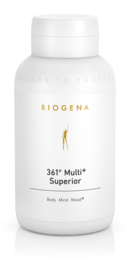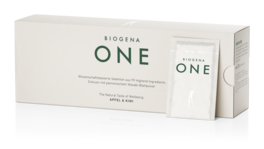The world of supplements is one that is full of variety. Thanks to the diverse composition and extensive areas of application of food supplements, more and more people feel included in the target audience for these products. But what are food supplements? And what can you expect from their intake? Let us throw some light on the matter.
What are food supplements?
Food supplements are concentrated sources of nutrients that are naturally present in our diets – for example, they provide vitamins, minerals, trace elements, but also botanicals or important fatty acids. As such, food supplements can supplement our diet in a targeted way, according to the motto "nomen est omen" (the name speaks for itself). Although we are primarily familiar with nutritional supplements from doctors, therapists, pharmacies and drugstores, these products are different in that they are over-the-counter and not medicinal products, i.e. they are foods, thus the manufacturer is responsible for their safety, and so a close look at their quality is extremely important.
What kind of food supplements are there?
There seems to be no limit to the variety of food supplements. Common forms of application include tablets, capsules, drops, sprays, powder sticks and drinks. The different presentation options give the consumer the opportunity to select his or her own favourite.
Not only the pharmaceutical forms, but also the range of substances contained are varied. These are either offered as a single substance (= mono-preparation) or combined with other substances in a wide variety (= combination preparation).
Key ingredients include:
- Vitamins and provitamins such as vitamin C, vitamin D, vitamin B12 and beta-carotene
- Minerals and trace elements such as magnesium, iron, zinc and selenium
- Fatty acids such as the omega 3 fatty acids DHA and EPA and the omega 6 fatty acid gamma-linoleic acid
- Amino acids such as L-glutamine, lysine and 5-HTP
- Vitamin-like substances such as coenzyme Q10, L-carnitine
- Special substances found in the body such as melatonin, hyaluronic acid and collagen
- Intestinal bacteria (probiotics) such as special lacto and bifidobacteria
- Carbohydrates and fibres such as oligofructose
- Enzymes such as special digestive enzymes or the histamine-degrading DAO
- Special botanicals and extracts such as OPC, astaxanthin, ashwagandha, curcuma, chlorella algae and incense
The ingredients may be plant-based, such as green tea, or derived from an animal source such as fish oil, or they may be synthetically produced, like many vitamins.
How do natural food supplements differ from other food supplements?
Natural food supplements are manufactured according to the so-called pure substance principle. This means that technological excipients used in the fully automatic production of capsules, tablets and sugar-coated tablets (e.g. separating agents) as well as excipients used for reasons of appearance or taste (e.g. artificial flavours, colours, etc.) are omitted. A complex semi-manual procedure makes it possible to avoid many unnecessary substances, which often have a higher share in standard products on the market than the actual active substances.
Natural supplements also often contain fruit powders or plant extracts that can provide concentrated vitamins and minerals, or secondary plant substances (phytonutrients). However, it does not make sense for all the nutrients to be derived from natural sources, because perhaps the desired amount of vitamin in the capsule cannot be achieved or the natural variant might not be stable. Alternatively, many nutrients can be produced in the laboratory today. This can be done simply by chemical reactions or by biotechnical fermentation using microorganisms, fungi or yeasts. Trusted manufacturers only use tested and EU approved vitamin and mineral forms and can provide information about the origin of the ingredients at any time.
What are the benefits of supplements?
Every person is unique. This is also reflected in individual needs, such as nutritional requirements. While every person needs the same nutrients, the need is not necessarily the same for every person – whether it’s due to genetic differences, personal circumstances or certain health issues.
While a balanced diet should form the foundation of nutrition, there are situations where there may be a special need. This is where food supplements appear on the menu. These products can help – used in a targeted way – to meet the specific nutrient needs, to close potential nutrient gaps and also to provide targeted support to the body in various areas. If they are well supplied, people find themselves in physiological equilibrium and take life in their stride.
Which supplements are useful?
Regarding which nutritional supplements are useful – and which are not – is difficult to say. Ideally, healthcare professionals or micronutrient experts will advise you on your individual situation and concerns. By means of a blood test they can determine how well the person’s respective nutritional supply is and recommend customised supplementation.
For certain groups of people, in addition to individual advice, there is also the option of using preparations developed specifically for them. For example, it is known that women who wish to have children must have good supplies of folic acid, that children have their own nutritional requirements and that zinc is an important mineral for men.
For groups of people with special needs, special nutrient solutions have been developed by BIOGENA. These nutrient compositions are aimed, for example, at men and women in different life situations, at children, athletes or vegans and can accompany them throughout life in a meaningful way through nutrient technology. You can find more information on this under the following sections:
What are the most important food supplements?
The question of the most important food supplements can only be answered with difficulty. Nevertheless, if you take a closer look at the nutrient supply of the general population, there are certain micronutrients where a suboptimal supply situation occurs more frequently.
The BIOGENA Good Health Study (GHS) is arguably the most comprehensive European study available in terms of micronutrients, health and well-being. In this large-scale study, in which 1377 people took part, a variety of micronutrients were examined. Based on the results of the Good Health Study and the laboratory chemical data from the Austrian nutritional report 2012, the important nutrients for food supplementation were summarised in the following table.
Sécurité et qualité
Dans l’UE, les compléments alimentaires sont soumis aux dispositions légales de la législation alimentaire (en particulier de l’ordonnance sur les compléments alimentaires) et donc à la surveillance des aliments. BIOGENA est certifié ISO 22000:2018 et répond ainsi aux exigences d’une entreprise consciente de ses responsabilités sur la sécurité alimentaire. Afin d’éviter que des salissures, pesticides et autres ne contaminent les matières premières des produits, nous faisons contrôler nos produits par LEFO, un institut indépendant. Après la production, chaque lot est soumis à des contrôles de qualité de l’institut LEFO.
Principe de substance pure
Les micronutriments étant souvent pris sur une longue période, il est important qu’ils soient composés d’ingrédients de premier choix. Nous nous conformons sans compromis au principe des substances pures. Nous garantissons ainsi une absorption optimale des principes actifs contenus ainsi qu’une tolérance optimale (voir encadré).
Biodisponibilité
De nombreux micronutriments sont disponibles dans différents composés chimiques, en particulier pour les substances minérales et les oligo-éléments. Le corps peut assimiler et valoriser certains de ces composés mieux que d’autres, leur biodisponibilité est donc plus élevée. La biodisponibilité décrit la vitesse et l’étendue de l’assimilation d’un nutriment ainsi que sa disponibilité sur le site d’action.
|
Nutrient |
Comment |
|
91 out of 100 participants in the Good Health Study were not optimally supplied (≥ 100 nmol/l). This is especially important in the winter months. |
|
|
23 out of 100 participants in the Good Health Study were not optimally supplied (Ferritin < 30 ng/ml). This is especially important for women of childbearing age – but not only then. |
|
|
The topic of folic acid is particularly relevant for women of childbearing age. Decreased status values are often observed in the population. |
|
|
87.6% of participants in the Good Health Study were inadequately supplied (Omega 3 Index < 8%). The topic of omega 3 fatty acids is particularly relevant for vegan/vegetarian people as well as for people who rarely or never eat fatty fish. |
|
|
The vitamin B12 supply in adults and the elderly was classified as marginal in the 2012 nutritional report based on laboratory analysis measurements.** Vitamin B12 is particularly relevant for vegans and vegetarians. |
|
|
The calcium supply of the total population (exception: adult men) was classified as critical based on laboratory analysis measurements in the 2012 nutritional report.* |
|
|
The selenium supply of the total population was classified as critical based on laboratory analysis measurements in the 2012 nutritional report.* |
|
|
The zinc supply of the total population was classified as critical based on laboratory analysis measurements in the 2012 nutritional report.* |
Table. Important food supplements
* Critical: > 20% have significantly reduced status values.
** Marginal: 5-20% have significantly reduced status values.
Tips for taking food supplements
When to take – The right time
For certain micronutrients, the optimal time of consumption is of crucial importance. In order to have orientation here, please adhere to the recommended consumption on the label or the recommendation of your accompanying physician or therapist. This ensures the best possible absorption.
EXAMPLES
Iron: Should preferably be taken on an empty stomach or 1 to 2 hours after a meal.
Zinc: Due to better tolerability and absorption, zinc preparations should be consumed in the evening.
Plant extracts: Eat immediately before or with a meal.
Omega 3 fatty acids and vitamins A, D, E and K: Consume with a (fat-containing) meal.
What is the best way to take supplements?
In the morning, at noon or at night, fasting or with a meal – the best way to take a supplement depends on its composition. It is therefore best to follow the recommendation of the respective manufacturer or seek advice from micronutrient experts or healthcare professionals.
Can you open the capsules?
Food supplements in capsule form can usually be opened without affecting the ingredients. However, there are exceptions. Enzyme preparations, for example, should not be opened since their active substance(s) is inactivated by contact with stomach acid. When taking iron, the loose powder could in turn lead to slight tooth discolouration, which is reversible. If you have problems swallowing and want to be on the safe side, please feel free to contact the manufacturer.
The right duration of use
Many people hope for a direct result from the consumption of a micronutrient preparation. Particularly in the case of a shortage situation patience is required, and this always pays off in the long term.
- Usually, the empty reservoir must be refilled first. This process usually takes a few weeks to months.
- In general, the consumption of micronutrients should be applied over a longer period of time.
- Irregular substitution is less successful than regular consistent supplementation.
How fast do supplements work?
Food supplements are designed for different purposes. While some supplements (e.g. multivitamin preparations) are designed to complement our daily micronutrient intake, there are others that are intended to come to the assistance of our body. No immediate effect should be expected from the latter, as nutrients are not medicines and generally require time to support our bodies in a sensible way. In addition, various factors, such as individual metabolism, health status and regular intake, can influence the effectiveness achieved by each person. Clearly, progress can be checked, for example, by regular whole blood diagnostics, in which, for example, vitamin, mineral and trace element levels, but also omega 3 status and more, are depicted.
The right dosage
The sensible combination and balanced dosage of vitamins, minerals, trace elements, plant extracts, enzymes and viable bacterial cultures is crucial. Please follow the recommended consumption on the label or the recommendation of your accompanying doctor or therapist.
Biogena is the specialist when it comes to product formulations. Each individual preparation is scientifically well documented in terms of dosage and composition.
- Combination preparations: Several ingredients in one product – can be used for a wide variety of purposes
- Mono-preparations: Only one ingredient in the product – enable targeted and individually tailored micronutrient intake
How many supplements can you take?
The number of food supplements you can take depends on the products you have chosen and on personal factors, such as your current supply situation or personal preferences. Your doctor will be happy to advise you.
Smart all-in-one solutions are now available for nutrition-conscious people, health-conscious personalities and well-being fans who want to supplement their diet perfectly with vital substances but do not want to take a whole variety of preparations.
Synergy effect and complex formation – food supplements sensibly combined
The optimal interaction of vitamins, minerals and other micronutrients in the metabolism is the basis for sustainably influencing well-being in a positive way.
EXAMPLES
Vitamin D, magnesium and vitamin K2: Only if magnesium is present can vitamin D be converted into its active form. And only active vitamin D increases the formation of osteocalcin – a hormone important for bone regeneration – which is then converted by vitamin K2 so that it can bind calcium in the bone.
Iron: The combination with vitamin C significantly improves iron absorption.
Which supplements should not be taken together?
In the case of food supplements, a distinction should be made between physiologically dosed products and high-dose products. At physiological doses (e.g. multi-preparations), interactions or absorption disorders do not come into play, since the moderate amounts do not mutually influence each other – as in a meal. In the case of mono-preparations, i.e. higher or therapeutically dosed vitamins and minerals, a time interval between the preparations should be observed as needed.
Not a good mixture is usually high-dose minerals, such as iron and zinc, which often hinder each other in their absorption. The same applies to vitamin A and vitamin K, which also interfere with each other in their intake. In this case, a time interval between taking the preparations is recommended.
In order to (among other things) clarify any interactions in advance, a micronutrient expert should be consulted before taking high-dose preparations and an ideal mode of intake should be discussed in the course of this.
The pill and food supplements
Certain medicines can change our nutritional needs. Such “nutrient robbers” also include the pill, which increases the need for certain micronutrients.
The contraceptive pill therefore requires more of the two B vitamins B6 and folic acid, whereby the latter is particularly important for women of childbearing age. In addition, the hormonal contraceptive also boosts the need for the vitamins B2 and C and magnesium – all the nutrients our body needs to obtain energy and reduce fatigue.
Without a doubt, the contraceptive pill is one of the safest contraceptives when used correctly, but users should be aware that the artificial hormones change their nutritional requirements. It is therefore all the more important to eat a balanced and nutrient-rich diet and, if necessary, to increase the intake of the relevant micronutrients through selected dietary supplements.
Questions about dosing
Why do supplements come in such high doses?
First of all: Not every supplement comes as a high dose. The dosage of a preparation is strongly dependent on its intended use. So there is a big difference between whether a nutrient preparation is used as a preventive measure to maintain metabolic balance or whether it is intended to achieve a targeted benefit.
It’s all in the dose – dosages are usually based on their intended use:
- Maintaining a nutritional balance: The dosages are usually within the range of the NRV (Nutrient Reference Value – legally defined reference quantity for daily intake; see below)
- Targeted preventive administration (e.g. in the case of susceptibility to infection or for the prevention of osteoporosis)
- Targeted correction of a deficiency: To refill empty nutrient stores higher therapeutic doses are required than to maintain an adequate nutrient supply.
What happens if you take too many food supplements?
Micronutrients are not just important to us humans, they are vital for survival. However, in the case of some nutrients (such as vitamin E, selenium), the long-term intake of excessively high doses can have adverse effects. These can manifest differently depending on the nutrient.
To avoid excessive nutrient intake, consumers should choose products from trusted quality manufacturers and adhere to their recommendations for use – quality products are designed for long-term use or provide information on limitations in the duration of use on the label. If several preparations are taken at the same time or if there are special needs (e.g. nutrient deficiency, absorption disorders), contact a doctor and seek advice and support from him/her. This applies especially if you belong to a sensitive group of people (e.g. children, pregnant women, breastfeeding women). If higher doses or several preparations are taken for longer periods, a whole blood analysis is recommended to rule out “too much”.
What does NRV mean for nutritional supplements?
The term NRV stands for "Nutrient Reference Value" and defines reference quantities for the daily nutrient intake of adults. These values have been set by European legislators and allow consumers to see at a glance how much of a supplement contributes to the coverage of the reference quantity. At the same time, these reference values also allow a pan-European product comparison in order to select the most suitable product from the vast array of products.
Manufacture of supplements & quality differences
Not all supplements are the same. They can vary greatly in quality due to the choice of raw materials and the manufacturing process. BIOGENA stands for the highest quality and transparency along the entire value chain with a commitment to the site in Austria. But what makes our products so special?
Only active substances, no additives
Food supplements can be manufactured according to various procedures. At BIOGENA, we produce in semi-automatic manufacturing according to the pure substance principle. This is more complex, but allows us to avoid unnecessary excipients – artificial colours, flavour enhancers, coatings and separating agents – during production, which would be required in a fully automatic process and are often found in a higher proportion in market-standard products than the actual active substances. We manufacture our capsules with precision, the raw materials of which are selected strictly according to quality and purity criteria, sustainability and scientific documentation. They come from certified suppliers from all over the world and are available in highly bioavailable compounds. Where possible, we pay attention to the absence of carrier materials when selecting raw materials. Where this is not possible, we use natural food ingredients such as maltodextrin, cellulose powder or calcium carbonate. The full declaration of all the ingredients is just part and parcel of what we do.
Production & logistics in your own hands
We produce our products ourselves in Austria and therefore have 100% control over all components. In our production plant, BIOGENA Good Health World, we produce in clean rooms, which, together with their machines, are carefully dusted after each production run. This ensures that a very pure room is available again for the next production. Our hygiene production is subject to strict statutory hygiene regulations, which we have voluntarily expanded significantly. Every employee wears his/her own production clothing and shoes and after thorough hand washing also puts on an astro hood with mouth protection. It is only after the subsequent shoe cleaning and hand disinfection that the work takes place. In addition, several cameras & weighing systems ensure exact control and safety in the filling process.
Through our own production and our own logistics centre, we are fast, flexible and reliable. We deliver 95% of all orders the next day.
Tested quality – voluntary & self-evident for us
We voluntarily have each production batch checked in a laboratory. Although this is not required by law, it is particularly important for us in order to have our high quality permanently checked and confirmed. For years, we have been working with the German LEFO Institute, an independent laboratory of experts, to check the products for various parameters such as impurities, pesticides, heavy metals, etc. and to ensure compliance with all food regulations. Test and quality seals on each product make this visible to consumers.
Sustainability always in focus
Environmental and climate protection is a major concern for us, because “there’s no planet B”. We therefore rely on sustainable, innovative solutions with energy efficiency. For example, our capsules are filled into ecological cans made of renewable raw material from an Austrian manufacturer. These BIOGENA eco-cans use Green PE from a by-product of sugar cane processing and thus offer future-proof packaging material for the valuable capsules. In addition, we rely on renewable energy – specifically on the sun with over 500 solar panels in operation and 450 others planned. Moreover, we have implemented many other measures and creative ideas such as planting trees, a vegan/vegetarian kitchen line, electric cars and more, in order to become “double climate positive”.
Personal contact
BIOGENA is not just a brand, but people. We are always available to our customers by telephone and email – for general concerns and also for scientific expert questions.
Safety and quality
In the EU, dietary supplements are governed by EU and national legislation on food safety (in particular, the Austrian Food Supplement Ordinance (Nahrungsergänzungsmittelverordnung)) and are monitored for food quality. Biogena is ISO 22000:2005 certified and thus fulfils the requirements for a responsible company. We regularly have our products tested by the independent LEFO Institute for Food and Environment in order to ensure that our raw materials do not contain impurities, pesticides, or other unwanted substances. After production, each batch undergoes further quality checks by the LEFO Institute.
Pure substance principle
Because micronutrients are usually taken over a long time, they must be made from premium ingredients. We are totally committed to the pure substance principle. This means that we seek to ensure the optimum absorption of active ingredients and guarantee the best possible tolerance.
Bioavailability
Many micronutrients are available in different chemical compounds – this is especially true for minerals and trace elements. Some of these compounds are better absorbed and utilised by the body than others. Accordingly, they have a higher bioavailability. Bioavailability describes how quickly and to what extent a nutrient is absorbed and available at the site of action.
Where can I buy food supplements?
Food supplements are sold in various ways – in pharmacies, chemists, supermarkets and various web shops, for example.
At BIOGENA, we offer a full range of top-class products that can be purchased both in our BIOGENA premium stores and in our BIOGENA online shop. Renowned physicians and therapists, as well as selected chemists, perfumeries, sports studios and wellness facilities, also offer a selection of BIOGENA products for purchase
FAQs
Taking approved food supplements is not a criterion for exclusion from blood donation. For people who donate blood regularly, it may even make sense to take some selected supplements with them, as donating blood is always associated with a loss of iron and water-soluble vitamins.
In Austria and Germany, approved food supplements may travel within the EU both in your suitcase and in your carry-on baggage (caution with liquid products!). This only applies to personal supplementation, so don’t take more than you need on holiday.
Anyone transporting food supplements in powder form must be warned that they may be subject to particularly close scrutiny at security checks. For trips outside the EU area, the requirements of the respective destination country should be checked in advance, as these may differ from those of the EU.
Ideally, always transport the supplements in their original packaging, as the ingredients are then quickly visible. In addition, the original packaging best protects the food supplements from moisture and light.
Sources:
https://www.gesundheitsinformation.de/was-sind-nahrungsergaenzungsmittel.html
https://www.efsa.europa.eu/de/topics/topic/food-supplements
Biesalski H.K. 2016. Vitamine und Minerale. DOI: 10.1055/b-0036-134841. https://www.thieme-connect.de/products/ebooks/lookinside/10.1055/b-0036-134841
Schmidbauer C, Hofstätter G et al. 2020. Mikronährstoff-Coach. Das große BIOGENA-Kompendium der Nährstoffe. Christina Schmidbauer, Georg Hofstätter (Hg.) 4. aktualisierte und erweiterte Auflage, 1158 Seiten.
Wäger M. et al. 2022. BIOGENA Good Health Study: Vitamin D. unveröffentl.
Elmadfa I et al. Österreichischer Ernährungsbericht 2012. 1. Auflage, Wien, 2012.
Rust P, Hasenegger V, König J et al. Österreichischer Ernährungsbericht 2017. 1. Auflage, Wien 2017.











